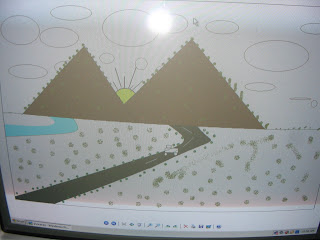Make a Difference (MAD), Cochin has played an invaluable role in shaping Speak Out. While BHUMI identified orphanages to start this project at, MAD brought The Teacher Foundation (TTF, Bangalore). The aim was to equip Bhumians with methodologies, ideas, and tips to make these English classes interactive and energetic. Little experience in teaching made this training mandatory for all our Speak Out volunteers. BHUMI will always be grateful to MAD for bringing one of the best and experienced trainers in the country.
Due to a large strength, the trainers decided to split the group into two batches (of 30 each). The two-day training programme was nothing like long, monotonous lectures. Volunteers were on their feet throughout the session, playing every activity that we would be taking back to our classrooms. In the 8-hour classes, volunteers dirtied their hands with fabric paint, composed jazz tunes, mimed short plays, and actively participated in group discussions. This way they were able to relate to the possible outcomes of implementing these activities with their batch of children.
http://picasaweb.google.com/BhumiChennai/TTFTraining1Aug9102008#
http://picasaweb.google.com/BhumiChennai/TTFTrainingSecondSession#
Feedback from a few volunteers:
“I honestly thought it would be some kind of theory session where someone would teach us how to teach! I had loads of fun and felt really childish after a really long time!! Plus learnt and lot and got a better perspective to the classes.”
What the training could have offered in addition: “A syllabus, in the sense, in school we were taught nouns first and then verbs and so on. So, a certain order alone can be given. Otherwise, it was great! :)”
- Uma Sekar, Volunteering at Dr.P.V.Rao School
“I expected to get a lot more ideas on teaching and handling overactive kids! It would be great if we got a syllabus from TTF or we could have a discussion with them about how much our children know and we can accordingly get a syllabus for each standard.”
- Deepthi Ravichandran, Volunteering at Avvai Home
“I hoped the training will be fun, because I was apprehensive that it was two full days, also being weekends. But, the class was actually lot of fun as well as learning! It was a good experience; It gave me an opportunity to learn the teaching methods.”
- Karthik Venugopal, Teach India Volunteer, Avvai Home
Unfortunately, we had a few practical difficulties in implementing this system. Most of our children, both from lower and higher classes, lacked basic knowledge in the subject. A small percentage of children (age no exception!) had problems identifying alphabets. Such a scenario compelled a change in the direction we had planned to adopt.
In addition, a syllabus was necessary to take structured classes. Two teachers with decades’ experience – Ms. Malathy and Ms. Prema, were introduced to BHUMI. The first workshop conducted by them provided volunteers with not just more tools but also a syllabus that revolves around ‘Drilling and Repetition’. The academic year has now been split into terms (3 months each). Starting from simple present and past, the course would gradually roll out into a more advanced one. Care has been taken to ensure that volunteers retain the original ‘learn-through-activities’ system.
Every term ends with a feedback session to discuss problems faced by volunteers during the term and syllabus for the next. The terms to come will start focussing on content from school textbooks, so that children start experiencing the benefits as soon as possible.
Cross posted from the BHUMI, Chennai Blog















